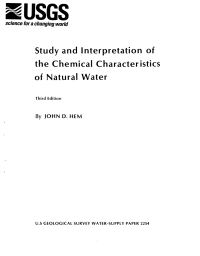The chemical composition of natural water is derived from many different sources of solutes, including gases and aerosols from the atmosphere, weathering and erosion of rocks and soil, solution or precipitation reactions occurring below the land surface, and cultural effects resulting from human activities. Broad interrelationships among these processes and their effects can be discerned by application of principles of chemical thermodynamics. Some of the processes of solution or precipitation of minerals can be closely evaluated by means of principles of chemical equilibrium, including the law of mass action and the Nernst equation. Other processes are irreversible and require consideration of reaction mechanisms and rates. The chemical composition of the crustal rocks of the Earth and the composition of the ocean and the atmosphere are significant in evaluating sources of solutes in natural freshwater.
Hem, J.D. 1985. Study and Interpretation of the Chemical Characteristics of Natural Water. U.S. Geological Survey Water-Supply Paper No. 2254, 3rd Edition.


